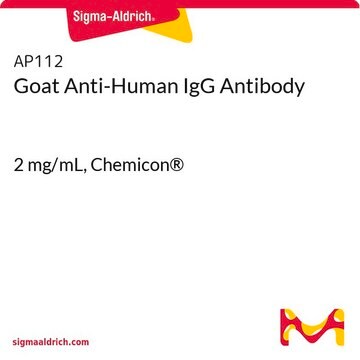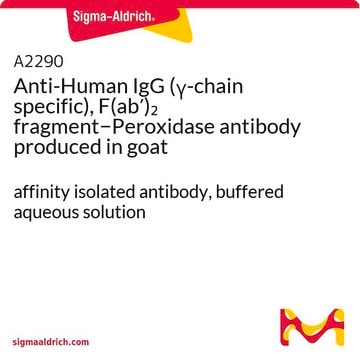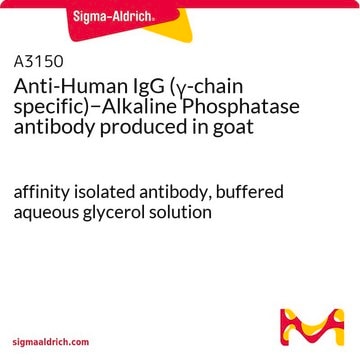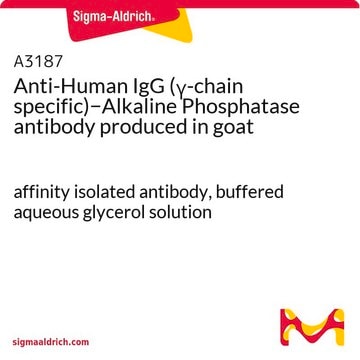A8542
Anti-Human IgG (Fab specific)−Alkaline Phosphatase antibody produced in goat
affinity isolated antibody, buffered aqueous solution
Sinónimos:
Goat Anti-Human IgG (Fab specific)−AP
About This Item
Productos recomendados
biological source
goat
Quality Level
conjugate
alkaline phosphatase conjugate
antibody form
affinity isolated antibody
antibody product type
secondary antibodies
clone
polyclonal
form
buffered aqueous solution
technique(s)
direct ELISA: 1:40,000
dot blot: 1:30,000
immunohistochemistry (formalin-fixed, paraffin-embedded sections): 1:50
western blot (chemiluminescent): 1:30,000
shipped in
wet ice
storage temp.
2-8°C
target post-translational modification
unmodified
General description
Specificity of the Alkaline Phosphatase Conjugated Anti-Human IgG is determined by Enzyme Linked Immunosorbent Assay (ELISA). Cross reactivity of the antibody-conjugate is also determined by ELISA
Identity and purity of the antibody is established by immunoelectrophoresis (IEP), prior to conjugation. Electrophoresis of the antibody preparation followed by diffusion versus anti-goat IgG and anti-goat whole serum result in single arcs of precipitation.
Specificity
Provides reduced background staining with mouse or rat samples.
Immunogen
Application
Biochem/physiol Actions
Other Notes
Physical form
Disclaimer
¿No encuentra el producto adecuado?
Pruebe nuestro Herramienta de selección de productos.
Storage Class
12 - Non Combustible Liquids
wgk_germany
WGK 2
flash_point_f
Not applicable
flash_point_c
Not applicable
Certificados de análisis (COA)
Busque Certificados de análisis (COA) introduciendo el número de lote del producto. Los números de lote se encuentran en la etiqueta del producto después de las palabras «Lot» o «Batch»
¿Ya tiene este producto?
Encuentre la documentación para los productos que ha comprado recientemente en la Biblioteca de documentos.
Los clientes también vieron
Nuestro equipo de científicos tiene experiencia en todas las áreas de investigación: Ciencias de la vida, Ciencia de los materiales, Síntesis química, Cromatografía, Analítica y muchas otras.
Póngase en contacto con el Servicio técnico
















